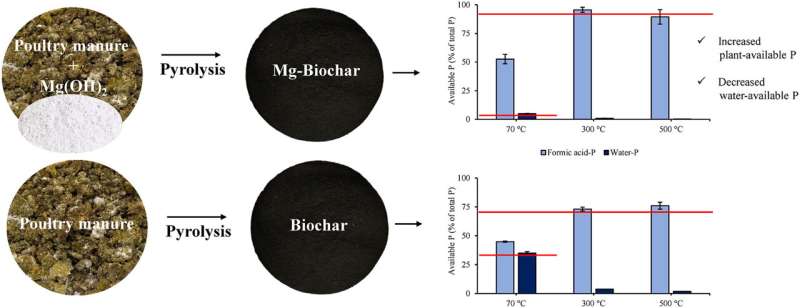Transforming chicken manure into nutrient-rich fertilizer for crops

An international collaboration between researchers from Brazil and the United States has identified a process for turning poultry waste into a soil additive for agriculture.
“Several countries have large poultry production, especially United States and Brazil, where agriculture is also concentrated,” says Aline Leite, a post-doctoral researcher from the Federal University of Lavras in Brazil. “So, reusing a global residue generated in large amounts is an interesting way of promoting a circular economy.”
The researchers harvested poultry manure from an experimental site in the United States, which they heated to become biochar, a carbon-rich substance that is used as a soil additive to replenish critical nutrients like phosphorus. Their work is published in Chemosphere.
“We are focused on understanding mechanisms that are responsible for increasing phosphorus availability in materials like manure,” says Leite.
Poultry manure is full of calcium and requires higher temperature treatments to turn the waste into biochar; however, these higher temperatures can have an effect on the amount of phosphorus available.
In order to ensure that the biochar contained sufficient available phosphorus, the researchers enriched it with another mineral, magnesium, which protected the phosphorus from the heat and enabled it to form more soluble forms of phosphorus.
Using the IDEAS and VLS-PGM beamlines at the Canadian Light Source (CLS) at the University of Saskatchewan (USask), the researchers were able to visualize the connection between phosphorus and magnesium and confirm the success of their technique.
While phosphorus reserves are found across the globe, the nutrient is a finite resource. Finding ways to recycle the mineral is an important issue for scientists.
“There’s no excuse for not using the phosphorus that is already in the food chain, for example, by reusing the waste that is already generated,” says Leite.
Leite says that synchrotron technology is essential for research into agricultural applications.
“This technology is extremely important for agriculture because it helps determine the concentration and forms of elements that are essential for plant growth,” says Leite. “By accessing the distribution of elements and understanding potential impacts, it gives us a great perspective for sustainable agriculture. The effective use of this technology in the study was only possible due to an international collaboration with researchers of different backgrounds.”
Leite’s study was developed at Cornell University, and carried out under the supervision of professors Johannes Lehmann (Cornell University) and Leônidas Melo (Federal University of Lavras, Brazil).
More information:
Aline do Amaral Leite et al, Magnesium-enriched poultry manure enhances phosphorus bioavailability in biochars, Chemosphere (2023). DOI: 10.1016/j.chemosphere.2023.138759
Citation:
Transforming chicken manure into nutrient-rich fertilizer for crops (2023, June 27)
retrieved 28 June 2023
from https://phys.org/news/2023-06-chicken-manure-nutrient-rich-fertilizer-crops.html
This document is subject to copyright. Apart from any fair dealing for the purpose of private study or research, no
part may be reproduced without the written permission. The content is provided for information purposes only.
For all the latest Science News Click Here
For the latest news and updates, follow us on Google News.

